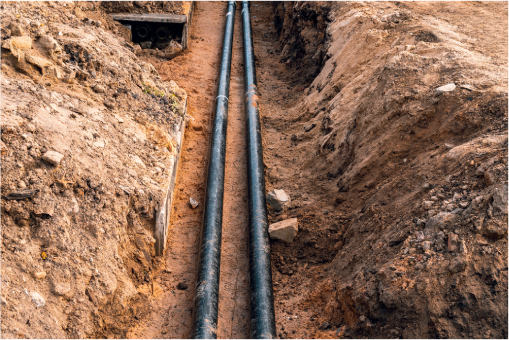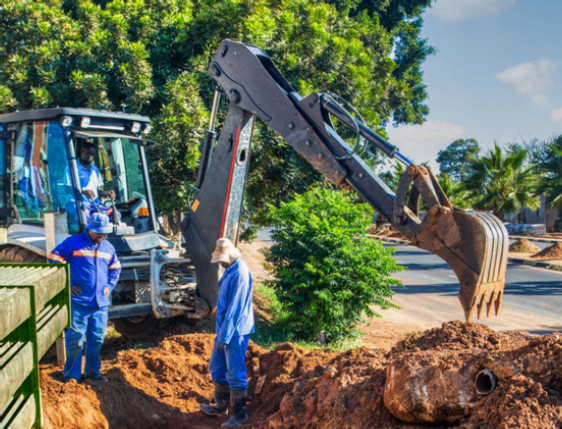What Counts as Ground Disturbance?
Includes:
Digging, excavation, trenching, hydrovacing, grading, blasting, vertical and horizontal directional drilling, land contouring and levelling, demolition, subsoil aeration or stabilization, driving fence posts, rods, or anchors and tree planting.
Excludes:
Residential, commercial or similar gardening, normal farming operations, grave digging in a cemetery, normal activities involved in land surveying activities, operations in a solid waste disposal site that has planned for buried facilities; the replacement of an existing traffic sign at its current location and at no more than its current depth; and normal road or highway maintenance that does not change the original grade of the roadway.
If You Intend To Disturb The Ground
If your work does not fall under the exceptions listed above, before starting any digging or ground work near roads or utility areas, you must:
- Request a locate from Pelican Energy TCI if your project is not exempt.
- Allow enough time for Pelican Energy TCI to mark underground lines before work begins.
If your project involves ground work in a public road allowance, highway, or utility right-of-way, for utility service on behalf of the customer:
- You must first get excavation approval from the TCIG Public Works Department.
- If installing new facilities, get line assignments from the TCIG Survey & Mapping Department before construction.
Whether on public or private land, Pelican Energy TCI requires:
- All potentially affected underground facilities to be identified and marked.
- This applies to everyone—contractors, homeowners, and utility crews.
- Planning for locates should be part of your job preparation.
The Safety Risks
Striking a buried line with heavy equipment, or hitting overhead lines with high loads can cause:
- Serious injury or death
- Major power outages
- Thousands in repair and service costs
- Delays to your project and disruptions to your community
Even without direct contact, electricity can arc—or “jump”—from a power line to nearby conductive equipment.
When equipment touches a power line, it endangers both the operator and anyone nearby. The electrical current can travel through the equipment into the ground, creating a high-voltage zone around the contact point. This voltage radiates outward in waves, energizing anything in contact with the ground.
Coordinating with Pelican Energy TCI and securing the necessary clearance are essential steps to avoid service interruptions and uphold public safety.
How to Request a Locate
Submit a request with project and site details online via https://www.pelicanenergytci.com/safemoves or call 649-946-4313. Submit your request a minimum of five business days in advance of a ground disturbance.
Pelican Energy TCI receives and processes routine phone-based locate requests between 9:00 a.m. and 4:00 p.m., Monday through Friday, except holidays.
Only emergency locate requests are processed after hours and on public holidays.
Within five business days of your request, Pelican Energy TCI will:
- Confirm in writing if it’s safe to dig,
- Complete the locate(s) and mark underground lines as requested, or
- Coordinate a suitable time to provide the locates.
- Provide documentation, i.e. a Buried Locate Report, to you (the requestor).
Your Responsibilities
- Mark your job site in white before requesting a locate.
- Use flags, stakes, or paint to clearly show where you plan to dig. This helps our team understand the exact area and mark underground lines accurately.
- Do not use mechanical equipment within 1 meter of marked lines until they are hand-exposed and visible.
- If marks provided by Pelican Energy TCI fade or are disturbed, a refresh must be requested.
- More permanent or offset markers that will stay visible throughout the project must be used by the ground disturber.
Special Requests
- Emergency Requests: Pelican Energy TCI responds within 2 hours.
- Priority Requests: Responds with urgency and within the requested timeframe.
- Major Projects: Request locates 10 days in advance and break into sections.
Emergency Locate Requests
Request an emergency locate from Pelican Energy TCI if there's a clear and present danger to life, health or property prior to disturbing the ground, and it becomes necessary to correct any abnormal situation due to breaks or defects in a buried facility (external to Pelican Energy TCI), including the disruption of essential services, or from a natural or man-made disaster.
Fast Response: Pelican Energy TCI aims to respond within 2 hours of receiving an emergency locate request.
Priority Locate Requests
If you need to repair or replace a buried facility (external to Pelican Energy TCI) but there’s no immediate danger to life, health or property, but there is some urgency, you can request a priority locate before digging starts.
Timely Response: Pelican Energy TCI will aim to respond within your requested timeframe.
Major Projects: Plan Ahead
If your project is large or complex and may take more than an hour to mark underground lines, submit your locate request at least 10 business days in advance. Be sure to include an estimate of how long the locate will take as this helps Pelican Energy TCI schedule their team and keep your project on track.
How Long Are Locate Marks Valid?
- Start within 14 days: If digging doesn’t begin within 14 calendar days of receiving locate marks, you must request new locates.
- Valid for 30 days: Once digging starts within 14 days, the marks are valid for up to 30 calendar days—if:
- Marks stay visible or are replaced with permanent references.
- Work continues without long interruptions (maximum 4 calendar day periods over weekends and weather delays).
- The site shows signs of active work during such interruptions (e.g., fencing, equipment, signage).
- Need more time? If work isn’t finished within 30 days, request a locate refresh from Pelican Energy TCI.
- Extension options: Pelican Energy TCI will decide, together with you, whether to extend the current locate or issue a new one.
- Large projects: Break big jobs into sections when requesting locates to keep things coordinated and safe.
- Not sure about the marks? If you think the locate marks aren’t clear or safe enough, request new ones.
Hand Expose Zones: Dig Safely Near Marked Line
- Stay 1 meter away from locate marks on both sides—don’t use mechanical equipment in this zone until underground lines are hand-exposed and clearly visible. This hand expose zone applies to all Pelican Energy TCI buried facilities.
- Pelican Energy TCI may require a larger safety zone in some cases. You’ll be notified if this applies to your site.
- Once Pelican Energy TCI lines are safely exposed by hand, mechanical equipment in the zone is only allowed with Pelican Energy TCI approval.






